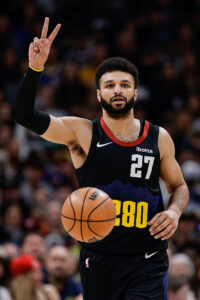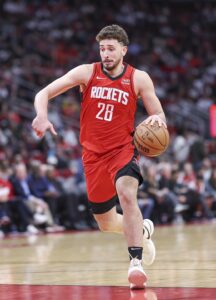The NBA made it a priority in its latest Collective Bargaining Agreement to do all it could to reduce load management and to ensure that the game’s biggest stars suited up more often. That resulted in the league beefing up its existing Player Participation Policy and introducing a new requirement for players to qualify for end-of-season awards.
In order to be eligible for all of the NBA’s end-of-season awards, a player must appear in at least 65 games (out of 82) during the regular season. That means they can’t miss more than 17 regular season contests.
Sixers center Joel Embiid and Cavaliers guard Donovan Mitchell are among the players who were on track to be All-NBA locks but who won’t play in 65 games this season due to injuries and therefore won’t be eligible.
However, it’s not quite as simple as looking at a player’s games played total at the end of the season and seeing whether or not it’s at 65+. There are scenarios in which a player could still qualify for award consideration if he appears in fewer than 65 games and scenarios in which a player would not qualify for consideration even if he technically appears in more than 65 games.
The technicalities:
First, it’s important to clarify that for the purposes of this rule, a player is considered to have played in a game only if he logged at least 20 minutes in that game. That requirement was implemented so that a player couldn’t, say, start a game, check out after 30 seconds, and have it count toward his total.
 A player is permitted to fall short of the 20-minute threshold twice and still have the game count toward his minimum as long as he logs at least 15 minutes in those games. So a player who plays 20 minutes in 63 games and 15 minutes in two more contests would reach the 65-game minimum. However, any outing of less than 15 minutes would not count toward the minimum.
A player is permitted to fall short of the 20-minute threshold twice and still have the game count toward his minimum as long as he logs at least 15 minutes in those games. So a player who plays 20 minutes in 63 games and 15 minutes in two more contests would reach the 65-game minimum. However, any outing of less than 15 minutes would not count toward the minimum.
Jamal Murray provides an excellent case study of how this rule operates in practice. If Murray plays in every Nuggets game for the rest of the 2023/24 regular season, he’ll technically have appeared in 66 contests. However, due to various injuries, Murray fell short of the 20-minute mark in three of those games, including two outings in which he logged fewer than 15 minutes.
As a result, Murray’s end-of-season game count may look like this:
- Games of 20+ minutes: 63
- Games of 15+ minutes: 1
- Games of fewer than 15 minutes: 2
- Total games: 66
In that scenario, he’d fall short of the minimum-game criteria despite appearing in 66 total games, since only 64 of them would qualify toward the required minimum.
The season-ending injury exception:
Rockets center Alperen Sengun, conversely, is an example of a player who may still qualify for end-of-season awards despite not reaching the 65-game benchmark.
A player retains his award eligibility if he logged 20+ minutes in at least 62 games (including 85% of his team’s games to that point), then suffers a season-ending injury.
The NBA defines a season-ending injury in this case as one that an independent physician (jointly selected by the league and players’ union) deems more likely than not to sideline the player through at least May 31.
Sengun played in 63 games for the Rockets, logging 20+ minutes in all of them, before suffering a severely sprained ankle and a bone bruise in his knee, an injury that could very well end his season. If an independent doctor determines the injury would likely keep him on the shelf through May 31, he’d be eligible for end-of-season awards, including Most Improved Player.
Grievances and challenges:
A player whose eligibility for awards could affect their next contract is permitted to file an “Award Eligibility Grievance” if he falls shy of the 65-game requirement. Such a grievance would be heard by a league arbitrator.
 Murray would be eligible for a Designated Veteran (super-max) extension if he makes an All-NBA team this season, while Sengun could become eligible for a Rose Rule rookie scale extension if he’s named Most Valuable Player this season (this obviously won’t happen, but could in theory). As a result, both players would be eligible to file an Award Eligibility Grievance, if necessary.
Murray would be eligible for a Designated Veteran (super-max) extension if he makes an All-NBA team this season, while Sengun could become eligible for a Rose Rule rookie scale extension if he’s named Most Valuable Player this season (this obviously won’t happen, but could in theory). As a result, both players would be eligible to file an Award Eligibility Grievance, if necessary.
However, the threshold for prevailing in a grievance of this sort is high. According to the CBA, the player must provide “clear and convincing evidence” that his team “willfully limited the player’s number of minutes played or games played during the regular season with the intention of depriving the player of (award) eligibility.” If Murray and Sengun fall shy of the requirements, it will be because of injuries, not because of any sort of underhanded tactics by Denver or Houston.
An Award Eligibility Grievance must be filed by 11:59 pm Eastern time on the day after the final day of the regular season, or within two days of the date on which it becomes mathematically impossible for the player to reach the 65-game minimum, whichever comes first. So Murray would have already had to file this grievance if he intended to do so.
A player who falls short of the 65-game minimum can also file an “Extraordinary Circumstances Challenge” in an effort to regain his award eligibility. In this case, the player must prove that if not for extraordinary circumstances, he would have met the 65-game requirement and that it would be “unjust” to exclude him from award consideration.
An Extraordinary Circumstances Challenge must be filed between 12:00 pm Eastern time on the final day of the regular season and 11:59 pm ET on the day after the last day of the regular season. The challenge would be heard by an “independent expert” jointly selected by the NBA and NBPA.
The CBA doesn’t define what sort of extraordinary circumstances would fall under this umbrella. Any sort of injury seems unlikely to qualify, but given that Murray may end up falling shy of award eligibility because he played 14:07 in one game instead of 15 minutes, perhaps his case will merit consideration.
Since we don’t yet have any precedents to refer to, we may have to see how situations like Murray’s play out to get a better sense of how this sort of challenge might – or might not – succeed.
The awards the 65-game rule does and doesn’t apply to:
Failing to meet the 65-game requirement doesn’t necessarily mean that a player is ineligible for every end-of-season award. The 65-game rule only applies to the following awards:
- Most Valuable Player
- Defensive Player of the Year
- Most Improved Player
- All-NBA teams
- All-Defensive teams
That means the following awards don’t require 65 games played:
- Rookie of the Year
- All-Rookie teams
- Sixth Man of the Year
Although the NBA offered no explanation for why 65+ games aren’t required for these specific awards, we can probably assume the league didn’t feel the need to impose extra requirements on awards that already only apply to a smaller group of players.
A player who made his NBA debut prior to 2023/24 won’t be eligible for Rookie of the Year or All-Rookie, and a player who starts more than half his games isn’t eligible for Sixth Man of the Year.
Being able to qualify for these awards despite not meeting the 65-game minimum does nothing for Murray, for example, since he’s not eligible for any of them anyway. However, the lack of a 65-game rule could come in handy for certain All-Rookie hopefuls who won’t reach that total this season, such as Mavericks center Dereck Lively II.
Note: This is a Hoops Rumors Glossary entry. Our glossary posts will explain specific rules relating to trades, free agency, or other aspects of the NBA’s Collective Bargaining Agreement.

I’m glad they put a rule in there it’s ridiculous how much they don’t play. The players did this to themself.
One could simply argue that a player who doesn’t play in enough games doesn’t deserve to win those awards. And I think most of the time, that will turn out to be the case
Kinda dumb really. If a player misses 18 games in the middle of the season he has to appeal but the guy who misses the last twenty is safe? That makes it more appealing to sit out at the end of the season if your team is set in the standings in order to preserve your eligibility status.
Very dumb